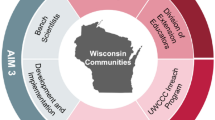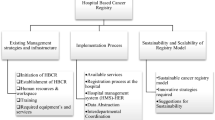Abstract
The Health Research Engagement Intervention (HREI) aims to reduce information and access disparities for breast cancer research opportunities among low-socioeconomic status (SES) and limited English proficient (LEP) breast cancer survivors by providing neutral, non-trial-specific information about health research via a trusted patient navigator. Qualitative methods in the context of a community-based participatory research design were used to iteratively design the HREI in collaboration with community-based care navigators from a trusted community organization, Shanti Project, and to locate appropriate research studies in collaboration with a web-based trial-matching service, BreastCancerTrials.org (BCT). Navigators were first trained in clinical trials and health research and then to deliver the HREI, providing feedback that was incorporated into both the HREI design and BCT’s interface. Our intervention pilot with low SES and LEP survivors (n = 12) demonstrated interest in learning about “health research.” All 12 participants opted to obtain more information when offered the opportunity. Post-intervention questionnaires showed that three of 11 (27 %) participants independently pursued additional information about research opportunities either online or by phone in the week following the intervention. Post-intervention navigator questionnaires indicated that navigators could confidently and efficiently deliver the intervention. LEP patients who pursued information independently faced language barriers. The HREI is a promising and potentially scalable intervention to increase access to neutral information about breast cancer research opportunities for low-SES and LEP individuals. However, in order for it to be effective, systems barriers to participation such as language accessibility at sources of health research information must be addressed.



Similar content being viewed by others
References
Ford JG, Howerton MW, Lai GY, Gary TL, Bolen S, Gibbons MC, Tilburt J, Baffi C, Tanpitukpongse TP, Wilson RF, Powe NR, Bass EB (2007) Barriers to recruiting underrepresented populations to cancer clinical trials: a systematic review. Cancer 112:228–242
Moffitt K, Brogan F, Brown C, Kasper M, Rosenblatt J, Smallridge R, Sullivan D, Kromrey J (2010) Statewide cancer clinical trial navigation service. J Oncol Prac 6(3):127–132
De Las Nueces D, Hacker K, DiGirolamo A et al (2012) A systematic review of community-based participatory research to enhance clinical trials in racial and ethnic minority groups. Health Serv Res 47(3pt2):1363–1386. doi:10.1111/j.1475-6773.2012.01386.x
Lang R, Kelkar V, Byrd J, Edwards C, Pericak-Vance M, Byrd G (2013) African American participation in health-related research studies: indicators for effective recruitment. J Pub Health Man Prac 19:110–118
Nápoles AM, Chadiha LA (2011) Advancing the science of recruitment and retention of ethnically diverse populations. The Gerontologist 51(suppl 1):S142–S146
Spiker CA, Weinberg AD (2009) Policies to address disparities in clinical trials: the EDICT project. J Cancer Educ 24(suppl2):S39–S49
Al-Refaie WB, Vickers SM, Zhong W, Parsons H, Rothenberger D, Habermann EB (2011) Cancer trials versus the real world in the United States. Ann Surg 254(3):438–443
Geller BM, Mace J, Vacek P, Johnson A, Lamer C, Cranmer D (2011) Are cancer survivors willing to participate in research? J Com Health 36:772–778
Symonds RP, Lord K, Mitchell AJ, Raghavan D (2012) Recruitment of ethnic minorities into cancer clinical trials: experience from the front lines. Br J Cancer 107(7):1017–1021
Green MA, Kim MM, Barber S, Odulana AA, Godley PA, Howard DL et al (2013) Connecting communities to health research: development of the Project CONNECT minority research registry. Contemp Clin Trials 35(1):1–7
Minkler M, Wallerstein N (Eds.) (2010) Community-based participatory research for health: from process to outcomes. Wiley
Ibrahim S, Sidani S (2013) Strategies to recruit minority persons: a systematic review. J Immigrant Minority Health 1–7
Germino BB, Mishel MH, Alexander GR, Jenerette C, Blyler D, Baker C et al (2011) Engaging African American breast cancer survivors in an intervention trial: culture, responsiveness and community. J Cancer Surviv 5(1):82–91
Paskett ED, Katz ML, Post DM, Pennell ML, Young GS, Seiber EE et al (2012) The Ohio Patient Navigation Research Program: does the American Cancer Society patient navigation model improve time to resolution in patients with abnormal screening tests? Cancer Epidemiol Biomarkers Prev 21(10):1620–1628
Battaglia TA, Bak SM, Heeren T, Chen CA, Kalish R, Tringale S et al (2012) Boston Patient Navigation Research Program: the impact of navigation on time to diagnostic resolution after abnormal cancer screening. Cancer Epidemiol Biomarkers Prev 21(10):1645–1654
Kanekar S, Petereit D (2009) Walking forward: a program designed to lower cancer mortality rates among American Indians in western South Dakota. SD Med 62(4):151–159
Cohen E, Belkora J, Tyler J et al (2012) Adoption, acceptability, and accuracy of an online clinical trial matching website for breast cancer. J Med Internet Res 14(4):e97
Nickell A. et al. (n.d.) Assessing the potential role of navigators to increase access to breast cancer research opportunities for low SES women. Under review
Larkey LK, Ogden SL, Tenorio S et al (2009) Latino recruitment to cancer prevention/screening trials in the Southwest: setting a research agenda. Appl Nurs Res 21(1):30–39. doi:10.1016/j.apnr.2006.09.003
Holmes DR, Major J, Lyonga DE, Alleyne RS, Clayton SM (2012) Increasing minority patient participation in cancer clinical trials using oncology nurse navigation. Am J Surg 203(4):415–422
Guadagnolo BA, Petereit DG, Helbig P, Koop D, Kussman P, Dunn EF, Patnaik A (2009) Involving American Indians and medically underserved rural populations in cancer clinical trials. Clin Trials 6:610–617
Steinberg M, Fremont A, Khan D et al (2006) Lay patient navigator program implementation for equal access to cancer care and clinical trials: essential steps and initial challenges. Cancer 107:2669–2677
Joseph G, Dohan D (2009) Recruiting minorities where they receive care: institutional barriers to cancer clinical trials recruitment in a safety-net hospital. Contemp Clin Trials 6:552–559
Joseph G, Dohan D (2012) Recruitment practices and the politics of inclusion in cancer clinical trials. Med Anthropol Q 26(3):338–360
Burke NJ, Luce J, Guerra C, Nibbe A, Zbaren N, Kaplan C, Pasick RJ (2013) Communicating about clinical trials: bringing the CIS to the underserved Poster presentation. Society for Behavioral Medicine, San Francisco
Acknowledgments
This research was supported by a grant from the California Breast Cancer Research Program (17AB-1500).
We gratefully acknowledge the support of the California Breast Cancer Research Program for funding this research. This research could not have been successfully carried out without the collaboration of the Shanti Care Navigators and Shanti clients. We greatly appreciate their participation. Susan Colen was instrumental in implementing the changes at BreastCancerTrials.org. We thank Matthew Simmons for his wonderful work on the intervention materials and figures presented here. BreastCancerTrials.org thanks the California Endowment for its support of the development of the Navigator Portal.
Author information
Authors and Affiliations
Corresponding author
Rights and permissions
About this article
Cite this article
Nickell, A., Burke, N.J., Cohen, E. et al. Educating Low-SES and LEP Survivors About Breast Cancer Research: Pilot Test of the Health Research Engagement Intervention. J Canc Educ 29, 746–752 (2014). https://doi.org/10.1007/s13187-014-0650-x
Published:
Issue Date:
DOI: https://doi.org/10.1007/s13187-014-0650-x




